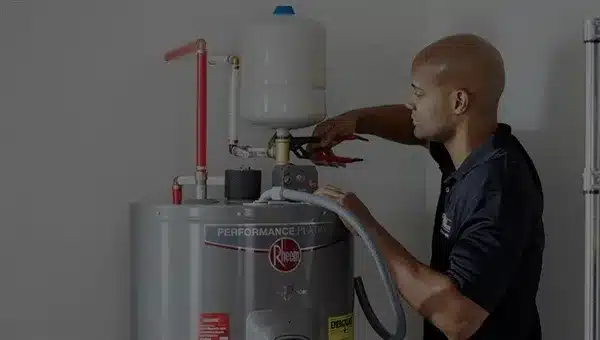Deciding on the right water heater installation for your home can be quite a conundrum, particularly for new homeowners unfamiliar with the complex world of plumbing systems. This blog post aims to simplify the process and guide you through each step, helping you make a well-informed decision that suits both your needs and budget.
Understanding Your Water Heater Needs
The first step in finding the right water heater is getting a clear understanding of your household’s hot water needs. Consider how many individuals reside in your house and the amount of hot water they typically use daily. For instance, do you have multiple bathrooms that are frequently used simultaneously? Do you often run the washing machine while taking a shower? These factors can affect the size and type of the system you need.
Another aspect to think about is the available space in your home for the water heater. A tank system requires more room than a tankless one, so you need to consider where the heater will be installed.
Lastly, you should think about your preference between a tank or tankless system. A tank system stores hot water for immediate use but can be less energy-efficient. A tankless system, on the other hand, heats water on demand, using less energy, but can struggle to provide hot water to multiple outlets simultaneously. Balancing your home’s water usage patterns with the pros and cons of each system will help guide you towards the most suitable water heater for your home.
Different Types of Water Heaters
Navigating through the variety of water heaters on the market, it’s crucial to recognize the three primary categories: conventional, tankless, and heat pump heaters. Each one comes with its unique characteristics and cost considerations.
Conventional water heaters are often a popular choice due to their lower upfront cost. These systems store and heat a reservoir of water in a tank, ensuring hot water is readily available when needed. However, they can consume more energy maintaining the stored water’s temperature, potentially driving up your utility bills over time.
Tankless water heaters, also known as on-demand heaters, only heat water as it’s needed, making them more energy-efficient. While their initial investment may be higher, they could save you more in the long run due to their reduced energy consumption. However, they may struggle to provide simultaneous hot water to multiple outlets.
Heat pump water heaters, or hybrid heaters, are considered highly efficient as they extract heat from the surrounding air or ground to heat the water. This makes them an environmentally friendly option. However, their effectiveness may be compromised in colder spaces where there is less ambient heat available.
Understanding the features and drawbacks of each type will help you weigh which heater is the most suitable for your home. Consider the energy consumption, upfront costs, and how well it would perform based on your household’s hot water usage patterns. In the end, the best water heater for your home is one that strikes a balance between cost, efficiency, and performance.
Evaluating Energy Efficiency and Cost
As you sift through your water heater options, prioritizing energy efficiency can be a savvy move. While heaters with higher energy efficiency ratings might have a steeper initial price tag, they could offer substantial savings in the long run by lowering your monthly utility bills.
When shopping, keep an eye out for the EnergyGuide label on each model. This helpful sticker provides a clear breakdown of the unit’s estimated yearly operating cost, offering a tangible way to compare potential long-term savings. It’s not just about the upfront cost; it’s about considering the big picture and making a strategic choice for long-term financial and environmental benefits.
Balancing the initial investment with the ongoing expenses can assist you in selecting a heater that won’t break the bank and meets your household’s needs. This careful analysis of energy efficiency and cost forms a crucial part of your water heater decision-making process.
Choosing the Right Installer
Opting for a qualified professional for your water heater installation can safeguard you against potential mishaps. Even though the allure of DIY can be strong, especially for new homeowners, this task is best left to trained experts. Incorrect installation could lead to poor performance, regular malfunctions, or even safety hazards. Start by seeking out installers who possess the proper licensing and credentials, ensuring they’re equipped to handle the job.
A good way to gauge the quality of potential installers is by examining their customer reviews. Look for a track record of satisfied customers and pay attention to comments about timeliness, professionalism, and quality of work. Remember, the most affordable quote may not always be the best choice. It’s important to also assess the value you’re getting for the price.
Transparency in pricing is another crucial factor to consider. Be wary of professionals who are vague about costs or avoid providing a clear breakdown. A trustworthy installer will provide you with a detailed quote, including the cost of the unit, labor, and any additional expenses. This upfront honesty can save you from surprise charges down the line.
Also, consider asking about post-installation services. Do they offer routine maintenance or warranty on their work? Will they be available for any potential future repairs? These questions can help ensure you’re not only investing in a high-quality water heater but also securing reliable support for its lifespan.
Navigating the world of water heater installation can be complex, but choosing the right professional can make all the difference. By conducting thorough research and asking the right questions, you can find a skilled installer who will help optimize your investment.
Maintaining Your Water Heater
Regular upkeep of your water heater is essential in preserving its longevity and maintaining its performance. This encompasses frequent examinations of the unit, where you should look for any signs of wear or damage. Also, to prevent sediment accumulation that can affect its efficiency, it’s recommended to drain the tank periodically.
The pressure relief valve is another critical component to check, as it ensures the system is not operating under excessive pressure. Opting for professional service for routine upkeep can be beneficial, as experts can spot and address minor problems before they develop into significant, expensive issues.
Proper maintenance does not only mean that your heater will last longer, it also means that it will function more efficiently, potentially saving you money on your energy bills. Thus, incorporating regular maintenance into your home care routine is crucial for maximizing your water heater’s lifespan and operational efficiency.
Availing of Rebates and Incentives
It’s worth taking some time to research whether there are any local or federal incentives that you can take advantage of when installing your new water heater. Various government programs often offer rebates or tax credits for homeowners who opt for energy-efficient appliances. The monetary savings from these programs can be quite substantial, making them a key consideration for those looking to minimize their initial expenditure.
An energy-efficient water heater not only helps you save money on your monthly utility bills, but it can also potentially pay you back through these incentives. The specifics of these programs can vary from place to place and from one year to another, so it’s essential to do your homework and stay updated.
Also, bear in mind that some programs might require that the installation be carried out by a certified professional, reinforcing the importance of choosing the right installer. So, before you proceed with your water heater installation, be sure to explore all potential rebate and tax credit options to make the most of your investment.
FAQs in Relation to Water Heater Installation
How much is a new water heater for a house?
The cost of a new water heater for a house in Clovis, CA can vary greatly depending on the size and type of water heater you choose. Standard tank-style electric water heaters may range from $1,500 to roughly $2,000, while gas models could cost between approximately $2,000 and around $2,500. Tankless water heaters are more expensive upfront but offer significant energy savings over time; these units usually range from $3,000 to as much as $4,000 or more.
How often should water heaters be replaced?
Water heaters should be replaced every 10 to 12 years, depending on the type of water heater and its usage. This is because over time, water heaters can become corroded or suffer from mineral buildup that can reduce their efficiency and lead to costly repairs. Furthermore, modern water heaters are often more efficient than earlier models, thus providing an opportunity to economize in the long run through substitution of an aged unit.
What is the number one water heater brand?
The companies Bradford White, Rheem, Rinnai, Navien, Stiebel Eltron, and A. O. Smith, are among the most prominent producers of hot water heaters now available on the market. These businesses are well-known for the high-quality items and inventive designs that they produce in order to meet the requirements of their customers.

